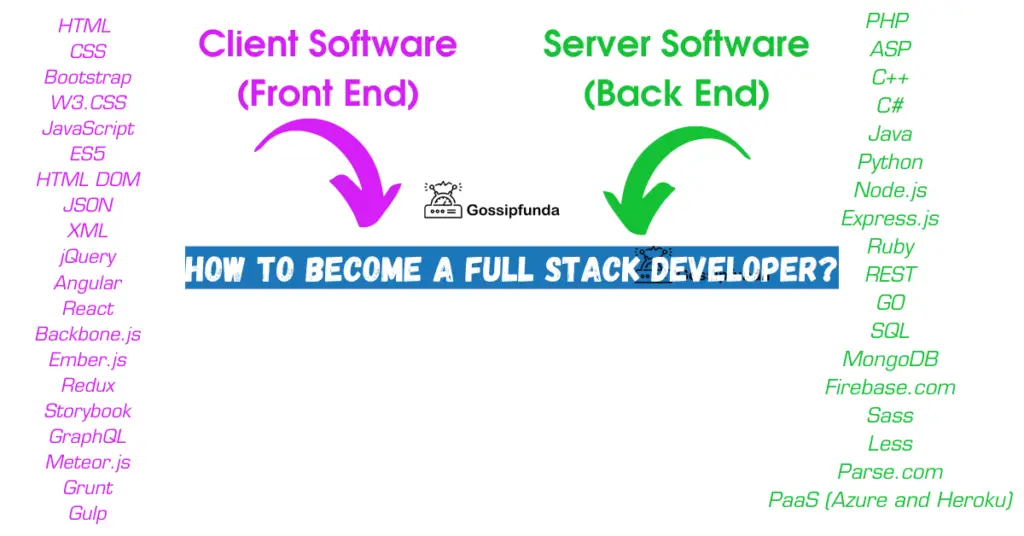Hello everyone, welcome back. So we are back today with a very interesting topic, that is How to become a Full Stack Developer? We will go through what is Full Stack, and the skills required to become a full stack developer. We will also be discussing the way to upgrade your skills and ace any interview.
Before we start, let’s have a look at the current scenario. This is an era where there is a spike in the craze of Machine Learning and AI. On one hand, Data Science is driving a great revolution in industries, and on the other we see new technologies based on Deep Learning come up. Software and web development is the primary thing, still. Suppose you build a Machine Learning model (let’s say some decision-making model for general people).
You have to deploy your model. Customers would require an interface to use your model, so deploying it in an application or a web server is important. This is where web development comes into play, with a lot of terms like front-end development, back-end development, and full-stack development. And, one needs different kinds of skills to ace in each field. Let’s go ahead and check what we mean by Full Stack.
Don’t Miss: Bluestacks

What is Full Stack development?
Full Stack development comprises both the front-end and back-end tasks. The front end refers to what the end users (or your customers) see. That is, the web page through which they interact with your content. The back end comprises the system that runs behind the web page. These include databases, hosting services, program scripts, API caller programs, and so on. So, a Full Stack developer has the necessary skills to manage both the front end and back end tasks for the company he works for.
Here we get a small difference between a Full Stack developer and a Software developer (or engineer). A software developer is known to develop any software or application (the front end part). However, a full stack developer has to work on both sides. This means that, a full-stack developer working to develop an application can be considered as a software developer, but not vice versa.
After we have compared a full stack developer and a software developer, let’s also compare a full-stack developer with a full-stack engineer. So, a full-stack engineer basically remains at a higher post with more things to manage. They do the full stack development (managing the front-end and back end stuffs). They also have the necessary know-how of project management and DevOps.
Learn also: content://com.android.browser.home/
Salary of a Full Stack Developer
This is also a very important aspect to be discussed. Developers and engineers in these roles have a high package, especially when they work for big companies. The average salary of a Full stack developer is about $ 109,508 per year (that is almost 80.5 lakhs Indian Rupees, as of now). If you compare it with a regular web developer, then here you go. The average salary of a regular web developer is about $ 71,130 per year. Huge difference? Well, yes. This is because it is obvious that a full-stack developer would be more skilled and would have to manage more portfolios than a regular web developer.
Pros and Cons of Full Stack development
Like everything on earth has some cons attached to its list of pros, Full stack development is no exception. Here are some pros and cons of going full stack:
Pros:
- Full stack developers can work easily on small teams. They can target tech start-ups that have fewer developer jobs.
- Full stack developers can communicate with both back-end and front-end developers. This is because they share the same skills, and this also helps to cut down on confusion.
- Since they have good knowledge of the back-end kinds of stuff as well, they don’t just solve the surface-level development needs. The thing for which they are most well known as, is that they solve all problems at once.
Cons:
- Full stack developers deal with both front end and back end stuffs, so it’s fairly difficult for them to prioritize projects.
- Getting skilled in both front end and back end stuffs is time-consuming.
- Companies hiring a full stack developer for both front-end and back-end development gets more work done by them, than the 40 hours a week general timing.
Skills required being a Full Stack developer
Now that we know about full-stack development, salaries, and some pros and cons, it’s time to discuss about the skills required. We can divide the skills into two parts – the front end development skills and the back end development skills.
Front end development skills include:
- HTML: The language that defines the structure of the web
- CSS: Creates and defines a page aesthetic, including layout, presentation, and formatting.
- Javascript: This multipurpose language allows programmers to govern how different page elements interact. You can also animate a web page and make it more interactive, with a good knowledge of Javascript. Frameworks like AngularJS and ReactJS are topics to grab a strong hold on.
Other than these basic requirements, a front-end developer deals with Asynchronous requests and AJAX, image editing, and most importantly, Search Engine Optimization or SEO.
Back-end development skills include:
- Programming and scripting languages: Python, Ruby, Java, etc. are the most common programming language for running back-end scripts.
- Framework: Choosing a framework for web applications to come under the back-end tasks. For example, Django (Python-based framework), Flask, etc.
- Database: Database administration is one of the most important and vital back-end tasks. From choosing and deploying a database (MySQL, PostgreSQL, Microsoft SQL Server, etc) to managing the database.
- Backup and Security: Deploying new and updated security solutions is an important need to keep the web application safe from spambots and attacks.
If the website is hosted on the cloud (AWS) or through any third-party host like WIX or WordPress, then the back end stuffs and security are taken care of by them.
How to upgrade yourself with these skills?
There are a number of ways to get yourself upgraded. However, discipline and consistency are just what it wants. MOOCs (Online course providers) like Coursera and edX offer a lot of Full Stack development courses. Not only that, but upon successful completion of the courses, you also get a verified certificate to showcase in your LinkedIn Profile or other portfolios. This gives you an extra edge over others, as it creates a good impression on the employer. It also shows your ability to taking initiative and completing them successfully, by the way. Taking courses on Coursera and other best platform, also lets you complete their hands-on labs, so you will be job-ready. What’s better than you being able to prove your skills in an organized manner?
Build an attractive and corporate-looking Web development Portfolio
Your portfolio is where you get to showcase your skills and projects. Organize your projects in your GitHub repositories. Just know that everything counts – even the projects you are doing under the courses while learning. You may also take expert advice while building up your portfolio. This is because it’s the ultimate and very important step and this is where most of people fail.
Next what you need to do is to apply for a job. There are many places where you can apply for a job. Many offer work-from-home jobs too. Some of them are:
- Fullstackjob.com
- Stack Overflow Jobs
- GitHub Jobs
- RemoteOk
- Indeed
- Glassdoor
- Internshala (Internships as well as Jobs)
Full Stack Web Developer job titles
Here is a list of some Full stack developer job titles. It is advised that if you are just starting out, apply for a lower role. The chances of you getting hired would be more. As you work hard and come under the spotlight with your skills, you will be promoted to what you deserve.
| Junior Full Stack Developer |
| Full-Stack Developer |
| Full Stack Engineer |
| Software Development Engineer |
| Full Stack Software Engineer |
| API Engineer |
Ace your Web Developer Interview
Regardless of how much skilled you are, failing an interview would not let you get hired. To ace the interview, you have to be prepared for technical job interview questions. The interviewer may ask you in-track questions from your front-end and back-end skills to test your knowledge. They may also test your aptitude by giving you a situation and asking you to write out the code. Get your laptop to showcase your portfolio and activities, this is important. Just be confident, you know everything. You just need to answer all of their questions correctly and confidently to get through it.
Conclusion
So now it’s time to pack your bags as we reach the end of the article. Gossipfunda has discussed almost everything regarding being a Full stack developer. We started out with what is Full stack development and what it requires to work in this field. Also, We have discussed its salaries and job opportunities. Next, we have also gone through the process of getting yourself upgraded with the required front-end and back-end development skills. I am sure this article would help you gain a good amount of knowledge regarding full-stack development.

I am a tech enthusiast. I have a keen curiosity in Data Science, Machine Learning, Deep Learning and Neural Networks. I have acquired knowledge in Python, SQL, Java, Amazon Web Services (AWS) and IoT (Internet of Things). I have built a couple of ML models and worked on datasets in IBM Watson Studio. Besides, I take great delight in content writing, which makes me come here, as I believe that this is one of the most reliable techniques for sharing one’s skill.